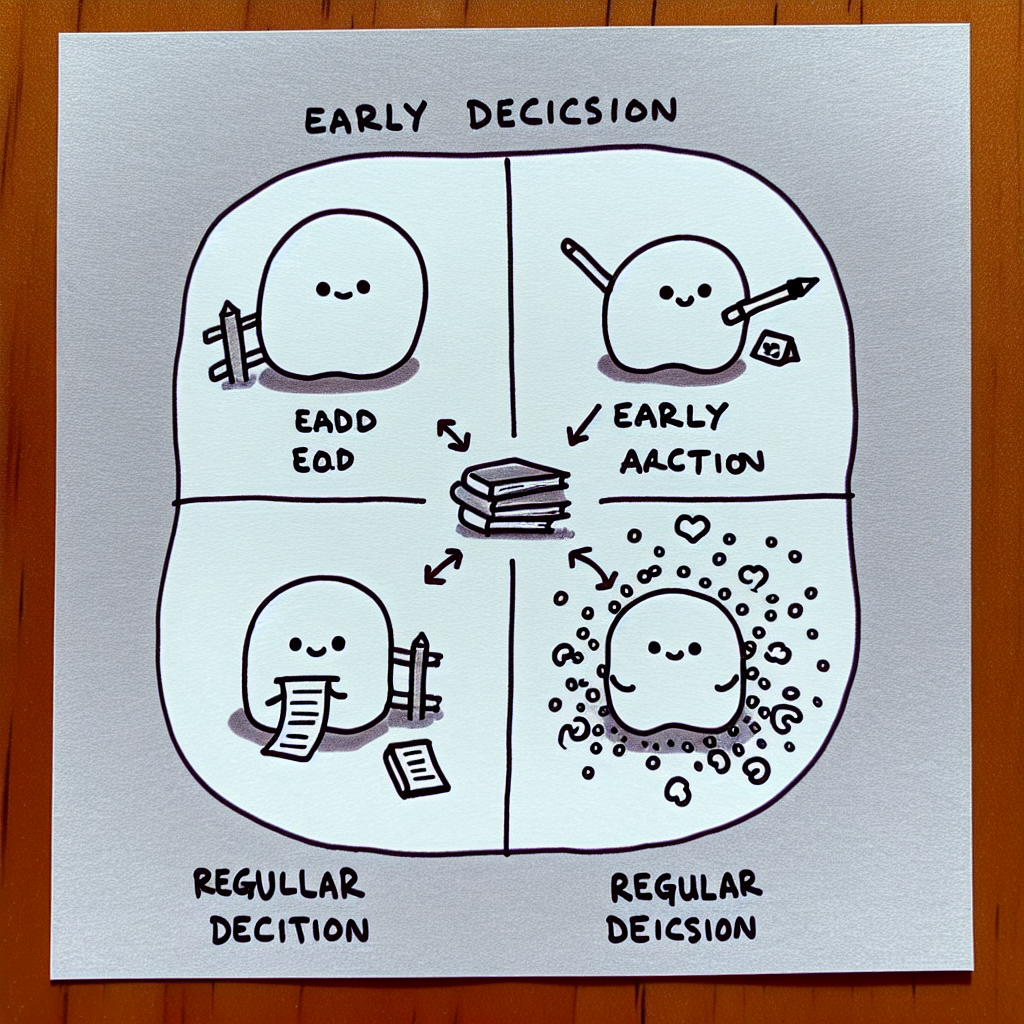Introduction: Why Ivy League Admissions Are So Demanding
The Ivy League is a group of eight private colleges and universities in the northeastern United States, known for their academic excellence, historical significance, and social prestige. These schools—Harvard, Yale, Princeton, Columbia, Brown, Dartmouth, Cornell, and the University of Pennsylvania—consistently rank among the top institutions in the world.
Getting into Ivy League schools is extremely competitive. In Fall 2023, Harvard reported an acceptance rate of just 3%, and Caltech—another elite institution often compared to the Ivies—had the same (usnews.com). These numbers reflect a hyper-selective admissions environment where thousands of high-achieving students compete for a limited number of spots.
To understand how to get into Ivy League schools, it’s important to recognize that these institutions use a holistic admissions process. This means they evaluate applicants based not only on academic performance but also on personal qualities, extracurricular involvement, leadership, and potential contributions to the campus community. Academic excellence is necessary, but it’s only one part of the larger picture.

📚 Academic Excellence: The Foundation of a Competitive Application
🏆 GPA and Class Rank
To understand how to get into Ivy League schools, it's important to prioritize academic excellence. A near-perfect GPA is often expected, especially in the context of a rigorous curriculum. Ivy League admissions officers look for students who are not only earning high grades but also excelling compared to their peers. Being in the top 5%—or better yet, the top 1%—of your graduating class significantly strengthens your application.
🧪 Rigor of Coursework
Admissions committees also assess the difficulty of the courses you've taken. Simply having high grades isn't enough if those grades come from less challenging classes. Enrolling in AP, IB, or honors courses wherever available shows a willingness to push academic boundaries. Prioritize core academic subjects such as math, science, English, history, and foreign languages. Demonstrating success in these areas signals strong college readiness.
🧠 Standardized Testing (Where Applicable)
Although many Ivy League schools have adopted test-optional policies, strong SAT or ACT scores can still enhance your candidacy. High scores serve as an additional data point that confirms your academic ability. If you choose to submit scores, aim for those in the top percentile. Furthermore, taking SAT Subject Tests or AP exams—especially in your strongest subjects—can provide further proof of academic strength and subject mastery.

🔍 Intellectual Curiosity and Specialization
A crucial component in learning how to get into Ivy League schools is demonstrating deep intellectual curiosity and academic specialization. These institutions look for students who go beyond standard coursework to explore their interests in meaningful ways.
💡 Pursue Independent Projects
Engaging in independent projects is one of the best ways to highlight genuine curiosity. This could include conducting scientific research, writing a book, starting a blog on a niche academic topic, or building a mobile app. These projects show initiative and a willingness to learn outside the classroom environment. For example, a student interested in marine biology might design their own experiment to study local aquatic ecosystems. Documenting and sharing these experiences can significantly boost your Ivy League application by illustrating a sustained and authentic passion.
🏅 Seek Academic Recognition
Competing in academic competitions demonstrates both mastery and commitment. Events like the Math Olympiad, Intel International Science and Engineering Fair (ISEF), and national debate tournaments are highly regarded by Ivy League admissions officers. Recognition in these arenas signals that a student can perform at a high level among peers nationwide.
Additionally, applying to selective summer programs such as the Research Science Institute (RSI), Telluride Association Summer Program (TASP), or Stanford's Pre-Collegiate Studies shows a willingness to immerse oneself in rigorous academic environments. Participation in such programs not only deepens subject matter expertise but also connects students with like-minded peers and mentors, further supporting their intellectual growth.
Ultimately, Ivy League schools are looking for students who are not just high achievers but thoughtful learners who are deeply engaged with their academic interests.

🎭 Extracurricular Activities: Depth Over Breadth
When considering how to get into Ivy League schools, your extracurricular profile should reflect focus, commitment, and genuine impact. Admissions officers are not looking for a long list of disconnected activities but instead value depth over breadth.
🎯 Focus and Impact
Concentrate on two to three extracurricular activities that genuinely interest you. Demonstrate long-term involvement and progressive growth in these areas. Whether it's music, science competitions, or debate, sustained commitment shows passion and resilience—qualities Ivy League schools highly value.
🤝 Leadership and Initiative
Leadership roles add significant value to your application. Starting a club, leading a team, or launching a community initiative indicates initiative and the ability to inspire others. Admissions committees look for students who take ownership of their interests and translate them into meaningful action with measurable results, such as increased participation, awards, or community impact.
🌍 Community Engagement
Engaging in volunteer work, advocacy, or civic initiatives that align with your values can strengthen your application. These activities should reflect a consistent desire to make a difference. For example, organizing a local food drive or advocating for environmental sustainability in your town demonstrates a commitment to societal betterment—something Ivy League schools seek in their future students.

✍️ Crafting a Standout Application
✨ Personal Statement and Supplemental Essays
When learning how to get into Ivy League schools, your personal statement and supplemental essays play a crucial role. These essays should reflect your authentic voice, values, and motivations. Avoid generic narratives—focus instead on specific life experiences that shaped your worldview or academic interests. Highlight key turning points, personal growth, or challenges you've overcome. Admissions officers are looking for depth, self-awareness, and originality.
🎯 School-Specific Customization
Each Ivy League school has its own mission, culture, and academic strengths. To make your application stand out, research each institution thoroughly using trusted resources like usnews.com. Tailor your essays and application materials to align with the values and opportunities unique to each school. Cite specific programs, professors, or campus initiatives that genuinely resonate with your goals and interests. This demonstrates a thoughtful and intentional approach.
💬 Letters of Recommendation
Strong letters of recommendation can significantly enhance your application. Select teachers or mentors who know you well and can speak in detail about your character, work ethic, and contributions. To support them, provide a summary of your achievements, goals, and experiences that might not be visible in the rest of your application. This context helps recommenders write personalized, compelling letters that reinforce your fit for Ivy League schools.

Application Strategy and Timing
🕒 Early Decision vs. Regular Decision
One of the most important choices in learning how to get into Ivy League schools is deciding between Early Decision (ED), Early Action (EA), and Regular Decision (RD). Applying through Early Decision can significantly increase your chances of acceptance due to smaller applicant pools and demonstrated commitment. However, ED is binding—if accepted, you must attend—which may not be ideal if you're comparing financial aid packages or still exploring options.
Early Action is non-binding and allows you to express interest in a school while retaining flexibility. Not all Ivy League schools offer EA, and some, like Harvard and Yale, have restrictive EA policies that limit you from applying early to other private colleges. Regular Decision offers the most time to refine your application but is also the most competitive due to higher application volumes.
📆 Planning Ahead
To build a strong Ivy League application, start early. Begin serious preparation by 9th or 10th grade. This includes selecting challenging coursework, maintaining high grades, and engaging in meaningful extracurricular activities. Developing a timeline for standardized testing—like the SAT or ACT—and identifying leadership opportunities will help you stand out.
By sophomore year, begin exploring potential essay topics and preparing for AP or IB exams. During junior year, take standardized tests and begin drafting your personal statement. By the summer before senior year, finalize your college list and request letters of recommendation.
🗂️ Application Components Checklist
Successful Ivy League applications are comprehensive. Be sure to complete the Common App or Coalition App with attention to detail. Submit official high school transcripts and standardized test scores, if required. Craft compelling personal essays that highlight your unique qualities and experiences.
Secure strong letters of recommendation from teachers or mentors who know you well. If you're applying to a program that values creative work, prepare a portfolio. Many Ivy League schools also offer interviews—take advantage of these to further demonstrate interest and fit. Schools also track demonstrated interest through campus visits, correspondence, and event attendance, so engage thoughtfully when possible.

🌟 Putting It All Together: The Holistic Candidate
When learning how to get into Ivy League schools, it's essential to understand that admissions teams look for more than just strong test scores and GPAs. They evaluate applicants through a holistic lens, seeking individuals who are not only academically capable but also display depth, character, and a clear sense of purpose.
🧬 Ivy League Schools Seek Well-Rounded Individuals with a Spike
Being well-rounded is important, but Ivy League schools are especially drawn to students who demonstrate a "spike"—an exceptional talent or achievement in a specific area. This could be a national award in science, published research, a groundbreaking nonprofit, or a unique artistic talent. A spike shows that a student has the drive and ability to excel at a high level.
At the same time, competitive Ivy League applicants also show academic rigor, leadership skills, and personal authenticity. A strong candidate might be the editor-in-chief of the school newspaper, a top math competitor, and someone who writes sincerely about their experiences in their personal essays. The combination of a standout achievement and a well-rounded profile reflects the kind of student Ivy League schools want to admit.
🔄 Continuous Self-Reflection
To build a compelling application, students must engage in continuous self-reflection. This means regularly evaluating your goals and ensuring your activities align with your values. Ask yourself whether your extracurriculars, academic choices, and personal projects genuinely reflect who you are and what you care about. Consistent reflection helps you stay focused and make meaningful decisions that strengthen your application.
🔍 Understand What Ivy League Schools Value
Knowing how to get into Ivy League schools requires understanding what they value in applicants. These institutions look for intellectual curiosity, leadership, initiative, contributions to the community, and personal growth. They want students who ask big questions, take action, and show resilience. Demonstrating these qualities through your achievements, essays, and recommendations can set you apart in a competitive applicant pool.

Resources and External Guides
When researching how to get into Ivy League schools, it's important to use reputable and data-driven resources. The following guides offer valuable insights into admissions trends, school profiles, and acceptance rates:
- U.S. News: Ivy League Schools Overview: This guide provides a comprehensive look at each Ivy League institution, including rankings, academic offerings, and student demographics. It's a useful starting point for comparing the eight schools side-by-side.
- U.S. News: Colleges with the Lowest Acceptance Rates: Understanding selectivity is key when learning how to get into Ivy League schools. This list highlights the most competitive colleges, including Ivy League institutions, and can help applicants gauge how their academic profile aligns with current admissions standards.

Conclusion: Your Path to the Ivy League
Understanding how to get into Ivy League schools requires more than just strong grades and test scores. Admission is highly competitive, but it is attainable with strategic preparation and a focused approach.
To strengthen your application, prioritize academic excellence while pursuing extracurricular activities that demonstrate leadership and impact. Craft a compelling personal narrative that reflects who you are and what drives you.
Every Ivy League school has its unique culture and values, so align your strengths and passions with the specific characteristics of each institution.
Start early, stay consistent in your efforts, and remain authentic throughout the process. These steps can significantly improve your chances of gaining admission to these prestigious universities.







.png)






